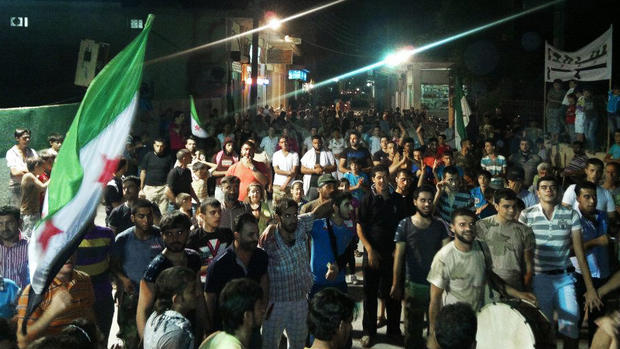Suicide bomb kills 4 at Syrian security compound
BEIRUT A suicide attacker detonated a car bomb near a Syrian security compound in a remote, predominantly Kurdish town Sunday, killing at least four people, state media said, in a new sign that the country's largest ethnic minority might be drawn into a widening civil war.
Opposition activists said at least eight Syrian intelligence agents were killed and several dozen people wounded in the attack in the northeastern town of Qamishli, more than 435 miles from the capital Damascus.
Syria's more than 2 million Kurds, long marginalized, have largely stayed out of the fighting, though some have participated in protests against the regime of President Bashar Assad.
- Syrian fighting torches historic medieval market
- U.S. aims to rally Syrian opposition with new aid
- Syria rebels in "decisive battle" with regime in Aleppo
The uprising against Assad that erupted 18 months ago has gradually morphed into a bloody civil war. The conflict has killed more than 30,000 people, activists say, and has devastated entire neighborhoods in Syria's main cities, including Aleppo, the scene of intense fighting Sunday.
The leaders of Turkey and Egypt, among Assad's main foreign foes, sent stern warnings to the regime and its allies, in speeches to Turkey's ruling party.
Egyptian President Mohammed Morsi said that "we will be on the side of the Syrian people until the bloodshed ends, the cruel regime is gone and Syrian people reach their just rights."
Turkish Prime Minister Recep Tayyip Erdogan urged Syria's allies Russia, China and Iran to end their support for Assad, warning that "history will not forgive those who stand together with cruel regimes."
Turkey has given shelter to tens of thousands of Syrian refugees and Turkish soil has served as a crucial logistical center for rebel fighters since they captured several Syrian border crossings with Turkey over the summer.
Also over the summer, Syrian troops left several towns and villages in the Kurdish northeast, possibly to divert forces to overstretched troops fighting in hotspots elsewhere. The regime ceded de facto control to Kurdish fighters who began exercising a degree of autonomy unheard of before.
However, the regime has maintained a security presence in Qamishli, which abuts the Turkish border, said Rami Abdul-Rahman, head of the Britain-based Syrian Observatory for Human Rights, an activist group.
There was no immediate claim of responsibility for Sunday's blast. Several previous suicide attacks in Syria were claimed by a Syrian militant group, the Al-Nusra Front.
Syrian state media said the explosion went off in an area housing security officers. It said four people were killed, dozens wounded and nearby buildings damaged. An amateur video posted online by activists showed a column of white smoke rising between buildings in Qamishli.
The Observatory said eight Syrian intelligence agents were killed and at least 40 people wounded in the explosion.
Most Kurds live in the northeast, but Aleppo and Damascus also have Kurdish-dominated neighborhoods.
Last week, a Kurdish district in Syria's largest city, Aleppo, was for the first time drawn into fighting between rebels and regime forces, amid conflicting reports about whether Kurdish gunmen fought alongside the regime or remained on the sidelines.
Fighting continued Sunday in several areas of Aleppo, as part of what rebels say is new push to drive out regime forces. Opposition fighters seized several areas in an initial offensive two months ago, but were unable to keep up the momentum. On Thursday, they announced what they said would be a decisive battle.
Either side could potentially shift the direction of an otherwise stalemated war if it seizes Aleppo, a city of 3 million people.
Abdel Kader, a commander of the Tawhid Brigade, the largest rebel unit in Aleppo, said by phone from Aleppo that his men were fighting in seven areas Sunday. Pro-Assad troops have been shelling rebel-held districts. Amateur video posted by activists Sunday showed Syrian warplanes flying over the city and heavy smoke rising from the city's skyline.
Another video showed night fighting. "We want to liberate the city from these shabiha," a man says in the background, referring to Syria's pro-Assad militiamen.
In the video, what appears to be a rebel fighter firing projectiles from the cover of a hillside to the shouts of "God is Great" from others nearby.
Syria imposes tight restrictions on foreign reporters and the authenticity of the videos could not be verified independently.
Before the civil war, Aleppo was Syria's business center.
Its walled old city with a medieval covered market, or souk, was recognized by the U.N. cultural agency as a World Heritage site, one of six in Syria. Late Friday, the fighting sparked a huge fire in the market that continued to burn Saturday, destroying hundreds of shops.
It was the worst blow yet to the city's historic center. The market with its vaulted passageways lined by stalls selling spices, perfumes and fabrics had been touted as one of the best-preserved old souks in the Middle East.
